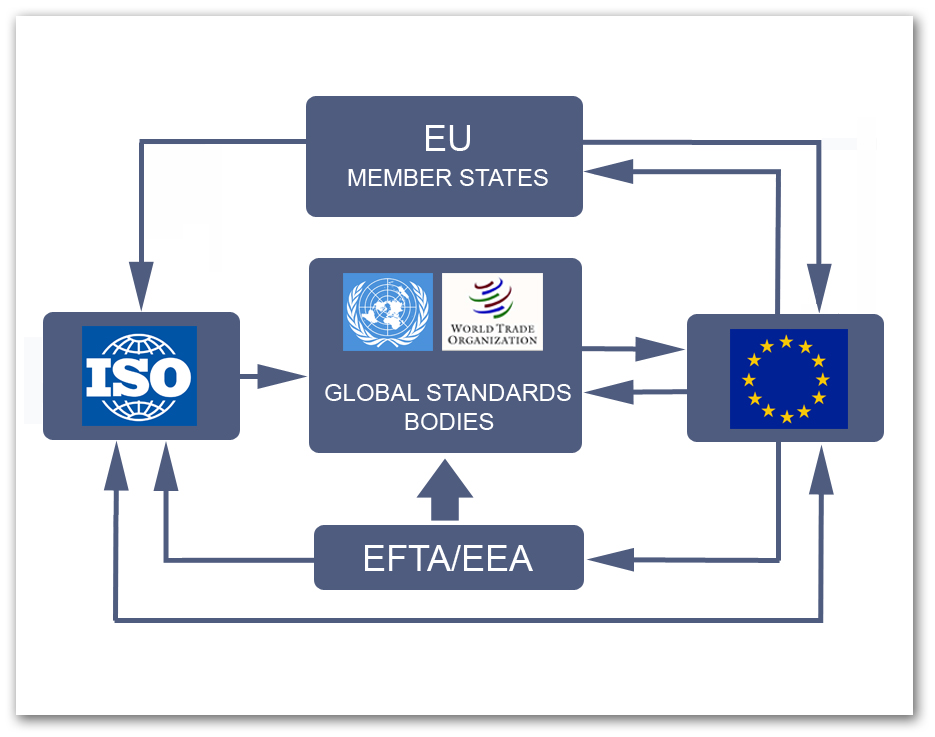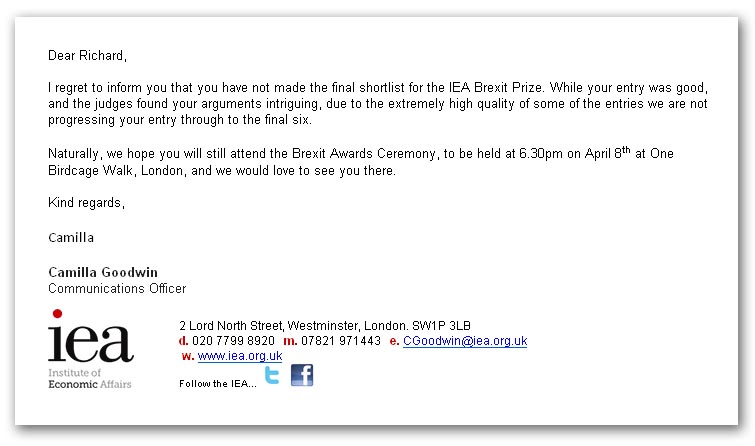Iain Mansfield will be a happy man this morning having won the Brexit prize and walked away with a sizable cheque. His winning submission can be found
here.
We invite readers, before they continue to read the rest of this post, to first study both the
winning entry and compare it with the
one submitted by Richard North, with help from his blog readers, which didn’t even make the final six shortlist, and come to their own conclusions.
We do so to negate the charge of “sour grapes” which of course is an easy accusation to make. We also like to make it clear that there's no particular personal ill will towards Mr Mansfield – that he’s entered a competition and won is hardly his fault.
That said as the winning contestant of what should be considered an academic paper with “prestige” he should put himself in position to defend the arguments he makes. By
deleting his blog this morning and also being hamstrung by being a member of the Civil Service he is compromised by failing to be able do so. As a consequence the paper cannot further the cause of UK exit.
Largely though our deep concerns are directed at the IEA and the potential severe damage this competition will do to the eurosceptic movement.
It’s worth noting that the competition wasn’t the idea of the IEA, it was instead the brain child of Lord Pearson, ex UKIP leader of course, and he raised the necessary funds. Pearson took the view that the IEA was a suitable organisation to run the competition.
What’s becoming apparent though is the competition wasn’t run with entirely honest intentions by the IEA, they have used the opportunity of Pearson’s 'naivety' - of not seeking a remit - to hijack it to impose their own free market ideology. That the IEA have attempted to hijack the prize is not just the opinion of Richard North but also some of the other contestants as well, who are equally unhappy.
It's also interesting to note that Mr Mansfield not only walks away with the main prize but also wins the prize for being "the best entry from an individual aged 30 or under”. How convenient.
Such concerns are reinforced by the continuing changes in the rules during the competition. Not only did the IEA arbitrarily impose upon contestants a further shortlist of six – which immediately announced that any submission failures were at least 7th best not 4th best - a decision which wasn’t stated from the start, but they then made public their clear expectations as demonstrated by the video above, contrary to the
original competition requirements.
After the competition had closed the judges revealed that they wanted a "free trade" solution, something that was never specified throughout the competition. As an example below is the full guidance sent via email sent on 25th November 2013 where a free trade only solution was not specifically required:
Dear all,
The Brexit judges met again last week and discussed the development of the short-listed papers into full submissions. They asked me to send entrants on the short list some further guidance, which has been integrated into the original further guidance, in order to help you meet the objectives of the competition.
1. The full paper should not concern itself with reasons as to why the UK might exit the EU or the advantages or disadvantages of such a step, nor should it spend time looking at how such a situation might arise. The starting point is that the decision to leave has already been taken and the paper should explore and set out a programme of policy steps to be followed by a UK government in that event.
2. While, obviously, you need to consider the precise mechanism and procedure for exit, this should not be the main or primary focus of the final submission. Rather the full submission should look at the areas of government policy and overall political economy that would be affected by a UK exit and suggest a coherent and structured set of policy responses. The most obvious one is trade policy but there are many others, notably regulation in general (including financial regulation, environmental regulation, labour market regulation, immigration, and so on), foreign and fiscal policies and wider questions of economic policy.
3. Wherever possible you should seek to provide costed and quantitative estimates and arguments. For example (and this only as an example, not a suggestion) there could be an analysis of trade flows over the last thirty years with estimates of where the greatest potential advantages from bilateral trade deals might lie; what trade policy options would confront the UK - from unilateral free trade through to joining particular free trade areas or remaining in the EEA; where the fastest benefits of lower trade barriers might be achieved and what impediments might stand in the way.
4. However, when it comes to some of the more difficult issues, there will not be a hard and fast answer. Nevertheless, entrants should try to provide estimates and make judgments and these must be backed up with argument and evidence.
5. Though the exit process should not be the primary focus of the papers, the successful entrant should include a clear sense of the practical steps that would need to be taken and the likely timetable in relation to them.
6. As the context for point 2, above, there should be a clear picture of the various choices and options facing the UK upon exit with a discussion of the pros and cons and there should be a discussion of the pros and cons of various special arrangements which the UK might make with the EU after BREXIT.
7. The entry should outline what the worst case for the UK might be after BREXIT and discuss ways of avoiding this and/or mitigating it if it transpires (for example, would the worst case be the EU refusing to negotiate any trade arrangements and refusing to make any agreements relating to the operation of UK companies throughout the EU and then imposing trade barriers and how might the UK respond?).
8. Use of several tables and charts should be expected.
The fact that none of the EEA solutions - or variations of - did not make the unexpected announced six adds weight to our suspicions. If contestants had been informed from the start of the "free-trade" desires of the IEA, then EEA solutions would not have been put forward by entrants on the basis that they had no chance.
Those who have now read both papers linked above may feel a sense of being completely underwhelmed by the winning entry. The winning paper contains wishful thinking, superficiality, and is completely lightweight. It simply does not address the complexities of leaving. It also contains basic errors such as this on page 12:
The Single Market is far more than a customs union or a comprehensive free trade agreement. The treaty that instigated the Single Market was not the Treaty of Rome, but the Single European Act of 1987 [sic], which concerned much more in depth matters of economic integration.
I have to remind my readers that paragraph was part of a winning entry. Unbelievable. One wonders whether Dr David Starkey is keen, as a constitutional historian of note, to be associated with a paper that quite clearly falls below the accepted standard of an academic paper.
Another example is point 8 in the email above; “Use of several tables and charts should be expected."
Point 8 caused no end of consternation for us. Richard’s submission put forward the case rightly - a point acknowledged by more than one judge on the panel - that exit from the EU was a political argument not an economic one. Given that the IEA is obviously an economic think-tank we concluded that they were looking for a paper festooned with economic graphs.
Typical examples are this paper from
Ruth Lea and this from
Nexit. With this in mind and after long hours of cogitation and discussion we managed to include in Flexcit many original tables and charts that were relevant to our submission which also tried to confirm with possible expectations of an economic argument. Even so we still had concerns that the lack of economic graphs was a potentially obvious weakness, in the sense of Richard’s submission being looked upon kindly by economically biased judges.
But as it turns out we needn’t have bothered or been worried. Clearly by the winning submission this was never an issue. By way of example this is an original graph from the Flexcit submission (click to enlarge throughout):
And another regarding the Article 50 process:
In contrast this is one from the winning submission, picked at random on page 57:
or this on page 56:
The graphs used in the winning submission have obviously been copied and pasted; they are unoriginal and they are blurred - in the paper - to the exent they are unreadable. And this submission won? Even by comparision with the papers (linked to above) from Ruth Lea, Roger Bootle and again
this from Ruth Lea all associated with the IEA this is a very poorly drafted paper.
And that is without noting it came up short in the word count - 10,000 to 20,000 words was the requirement - the winner came in at fewer than 9,500 words.
As Richard notes, Mansfield's arguments are also incoherent:
Mansfield,
however, rejects the idea of joining the EEA, although he does suggest
we join EFTA. As an aside, does he explore the views of EFTA members,
as to whether they would accept the UK? He doesn't, but we did.
I actually went to Norway, and to Iceland. The Norwegians and Icelanders
both, wanted us in EFTA and the EEA, because we could help them
renegotiate the deal. Would they want us in EFTA without the EEA? I
very much doubt it – but this is something Mansfield doesn't even
explore. And the judges let him get away with it.
Howsoever, what Mansfield advocates is a pick'n mix bilateral agreement,
adopting a position "somewhere between that of Turkey's and
Switzerland's membership of EFTA". This is not only politically
unattainable in the timescale, it is incoherent.
Turkey's relationship with the EU is of membership of a Customs Union.
Switzerland has bilateral free trade deals with the EU. The relationship
with the Swiss deals and EFTA is complex. Some are via EFTA, some are
outside. But the one thing absolutely certain is that there is no
position at all between Turkey and Switzerland. Mansfield is comparing
chalk and cheese.
And, having talked so some of the other competitors last night, I know
that we were not the only entrants to point out the impossibility of
attaining an ab initio bilateral deal within the two years.
The big danger now is that the eurosceptic movement will be hampered by this paper which now has "prestige" and is seen as best way forward. Europhiles will take great delight in taking it apart - it will be seen as the best eurosceptics can offer. It’s going to be akin to shooting fish in a barrel. Huge damage has been done.
I'll end this post with the now ironic words of one of the judges:
“In the past most politicians have focused on the economic rather than the political implications of the European Union. The debate about Europe‘s future is a battle of ideas and ideologies. The European Union has always been a deeply political project."
The IEA is simply another London based institution that will not understand how or why the EU exists. It's lost any credibility it had left whatsoever.







